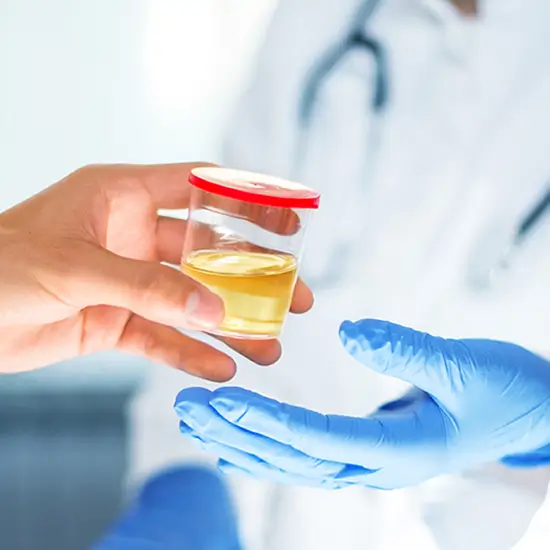
Book Glucose (PP) Postprandial Urine Appointment Online Near me at the best price in Delhi/NCR from Ganesh Diagnostic. NABL & NABH Accredited Diagnostic centre and Pathology lab in Delhi offering a wide range of Radiology & Pathology tests. Get Free Ambulance & Free Home Sample collection. 24X7 Hour Open. Call Now at 011-47-444-444 to Book your Glucose (PP) Postprandial Urine at 50% Discount.
Glucose is very essential to our body as it is the main source of energy in the body. Very high or low level of glucose is not good for our body. Insulin is a hormone responsible for the correct use of the glucose by the cells.
If there is an unusual change in the insulin level then glucose level also gets imbalanced. If the glucose level is high, it can be the cause of hyperglycemia and if the level of glucose gets lower it can negatively affect the brain and can cause dysfunction in the nerves.
Glucose Postprandial Urine Test is prescribed to check the level of glucose in body after having a meal. This test is also recommended to know the after effects of insulin therapy in patients of diabetes.
The Glucose Postprandial Test is used to check for Prediabetes and Diabetes Types 1 and 2 by measuring the amount of glucose in the urine. Two hours following the beginning of the last meal is when the test is conducted. Postprandial refers to a period following a meal.
If you have signs or symptoms of diabetes, such as extreme appetite, excessive thirst, frequent urination, or weight loss, the glucose postprandial is finished.
to track diabetics' blood sugar levels in order to evaluate kidney damage
In order to evaluate the impact of treatment on diabetics.
Once two hours have passed since the beginning of the last meal, the glucose postprandial test analyses the levels of glucose in the urine.
All of the body's cells use glucose, a simple sugar or monosaccharide, as their primary source of energy. It's crucial to understand that the neurological system only receives energy from glucose. The simplest form of carbohydrates found in food is termed glucose, which is absorbed by the intestines and carried to numerous organs via the blood. Cells in these organs then use it to make energy where it is required. The excess is either temporarily stored as glycogen in the liver.
Every time you eat, your blood sugar levels rise. In response, your body releases insulin, which lowers those levels until they return to normal. Glucagon, another pancreatic hormone, is released if blood glucose levels drop too low. The liver is instructed by glucagon to produce glucose from stored glycogen and release it into the circulation. A feedback loop is established by the hormones glucagon and insulin to maintain blood glucose levels within the normal range. High or low blood sugar levels in the body might be brought on by an imbalance in their activities.
To create urine, the kidney filters the blood. In most cases, urine contains little or no glucose. Glycosuria, or a high level of glucose in the urine, is a sign of extremely high blood glucose levels.
Results of the urine glucose-PP and urine sugar-PP tests to interpret
Urine sample is taken as specimen for this test. As this glucose test is postprandial, patient is supposed to give sample after 2 hours of having a meal. Discuss your medical history and medicines you are taking beforehand and your doctor can tell whether you should stop consuming any medications prior the test.
If you are having following symptoms
Healthy level of glucose in the body
When Glucose level reaches more than 180 mg/dl, it starts leaking in the urine and shows an underlying issue.
Cost of Glucose Postprandial Urine Test can be from INR 50 to INR 100.
Ganesh Diagnostics are one of the best service providers in the pathological industry. It is our vision to have a trusted patients base who trust in our abilities to perform up to their standards.
| Test Type | Glucose (PP) Postprandial Urine |
| Includes | Glucose Urine Postprandial Test (Physician) |
| Preparation | |
| Reporting | Within 24 hours* |
| Test Price |
₹ 100
|

Early check ups are always better than delayed ones. Safety, precaution & care is depicted from the several health checkups. Here, we present simple & comprehensive health packages for any kind of testing to ensure the early prescribed treatment to safeguard your health.